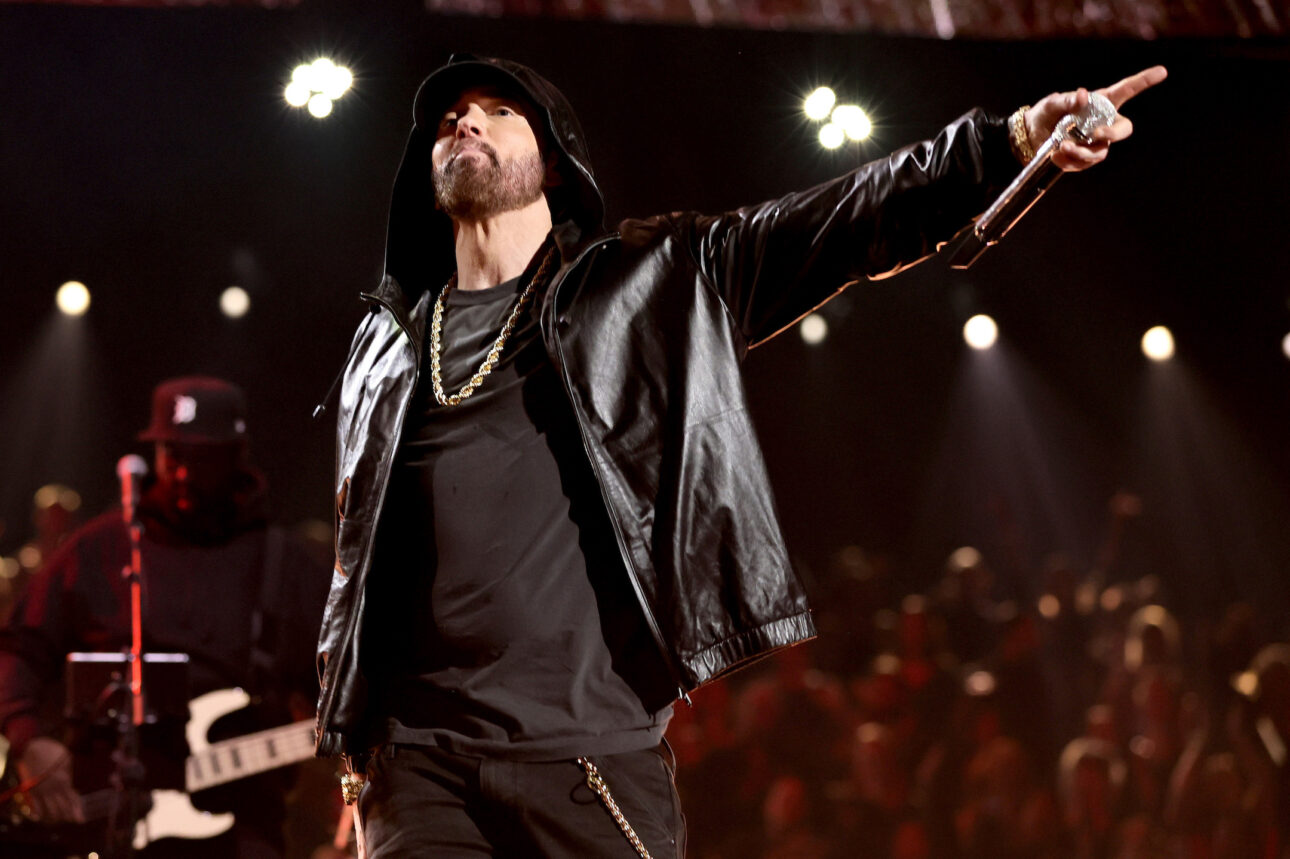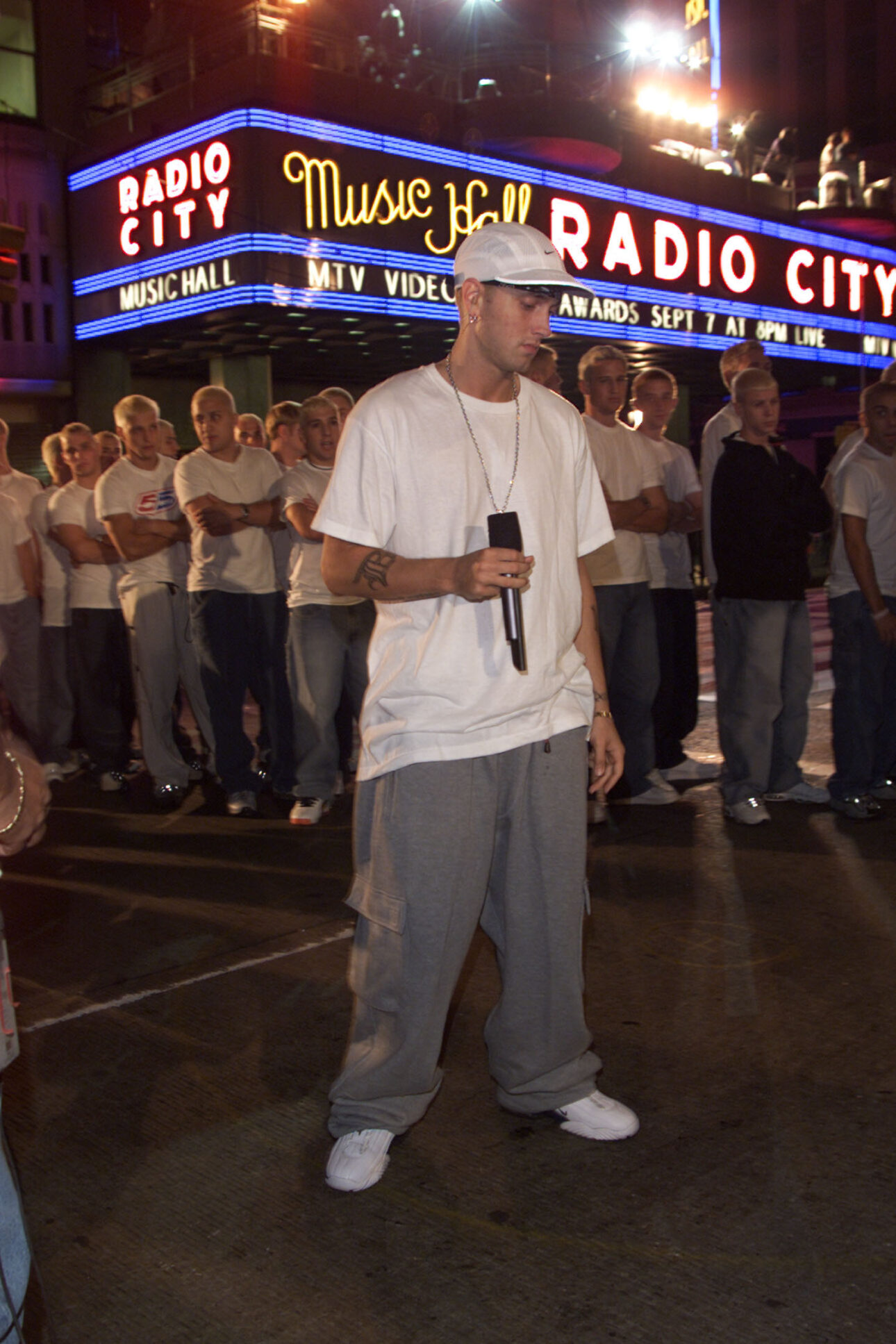
More from Spin:
- Eminem Is Mostly in Defense Mode on ‘The Death of Slim Shady’
- 5 Albums I Can’t Live Without: Austin John Winkler Formerly of Hinder
- Eminem Reappears With New Single, ‘Houdini’
I recently came across Eminem’s Hall of Fame induction speech by Dr. Dre. One thing that particularly stuck with me was when Dre mentioned his community and peer group were against him working with a “White rapper.” Dre responded that Eminem would be the biggest-selling artist on his label — he did eventually become one of the biggest-selling artists of all time.
And The Death of Slim Shady (Coup De Grâce), Eminem’s twelfth studio release, just entered the charts at No. 1, his eleventh No. 1 album.
I have to admit it was not until “Killshot” that I re-engaged with Eminem. I believe that diss track turned MGK emo — I’m not sure MGK has come back to rap since that “bitch-slap” dropped.
Sensitivity and loss of humor exist at all levels, not just within a generation, but very often among those who report in the media, and it’s even divided by party lines. Because Eminem takes aim at Gen Z, he shares those thoughts on his album. The way the ideals of a generation slip into mainstream thinking is through the media. And you can argue critics are at the forefront of media and helping to establish or reaffirm those opinions.
Eminem taps into something primal for me and my fellow Generation X-ers, the same way Rage Against the Machine and Oasis do. Their complete disregard towards anything other than the opinions they hold true is what art should be.
It also seems that much of the younger generation has lost their sense of humor. Or at least the ability to laugh at themselves.
I for one found it funny that on the new record Slim Shady dissed a whole generation on two tracks, “Trouble” and “Antichrist”:
Gen Z, here they come now
‘Bout to unload rounds
Pronouns
Got me like, “Whoa now”
Somewhere along the way, people started to take themselves too seriously, and when I say people, I specifically mean music critics.
I’m not talking about all critics, but a certain cohort who believe they are the arbiters of what is and isn’t acceptable. But I started to wonder, why do they get to be such a loud voice? What entitles Dash Lewis from Pitchfork to write: “Eminem was an unavoidable cultural force. Those diatribes sound even whinier now.”
Hmmm, you know who sounds whinier to me?
But as I was looking at Dash’s work, I started to realize something: That music critics seem to write far more positive reviews than negative reviews. A 2011 study published in the Journal of Cultural Economics analyzed thousands of music reviews and found that positive reviews are far more prevalent. So I did a study of my own. I went back through all of Dash Lewis’s reviews to April of 2023. He reviewed 26 albums in that time period. The Pitchfork review system’s highest review is a 9.9 — used only once, for the Complete Motown Singles, in 2007. Dash had no review lower than a 7.1 out of 25 reviews, until Eminem’s record, which got a 4.8. Dash’s average review was 7.6.
What’s the reason for this anomalous mark? Apparently only choosing to review what you like and want to review — or work by musicians who toe some prescribed cultural sensitivity line? That’s not always the way art works, Dash.

Rob Sheffield wrote in Rolling Stone that Eminem clings to his teenage views and continues to blame his problems on others, particularly women and the LGBTQ+ community, making the album feel disconnected from contemporary issues. At one point he writes: “Every time he says ‘woke’ or ‘canceled’ or ‘transgenders,’ it makes you think of Hugh Hefner on The Girls Next Door and how none of those girls had the heart to tell Hef how silly he looked in the sailor hat,” and “He begs to get canceled by audiences who don’t think about him and have no idea he thinks about them.”
Well, is that actually true? Is Eminem that out of touch, irrelevant? Because it seems to me that you, Rob Sheffield, are talking about it. That makes it very contemporary. You wouldn’t be if it wasn’t relevant and you didn’t have such strong opinions about the album in the first place. So, not so disconnected then. Just a different opinion than yours, or the safe, generally established politically correct opinions (also true of SPIN’s review, apparently).
Digging into Sheffield a little deeper, it also became very clear what type of artists he preferred. Just google his name and Taylor Swift, who he has reviewed obsessively. He even ranks 274 of her songs in one piece. He points out that Billie Eilish is playful, pissed, and brilliant. Olivia Rodrigo crushes expectations while again being pissed. It doesn’t take a detective to unearth what type of music Rob is a fan of.
And it’s easy to find what he is not a fan of. Just look at the August 2022 review of Be Here Now by Oasis. “Be Here Now is a lot more than just another flop album. It’s the kind of flop that legends are built on. Not just a flop. The flop. The flop that killed the 20th century. We will never get another rock flop like this.” Then he goes on to compare it to the Hindenburg disaster, the gas-stuffed zeppelin of “The horror! The horror!” fame that crashed in New Jersey in 1939, to completely ruin the fun. Thirty-five people died that day.
So what! He’s making a point about how much he thought the Oasis album was [checks notes] a flop!
The thing about Eminem is, he has never really changed — although, maybe for the better after sobriety. When you grow with the artists you love and connect to their struggles and trials, it means that the music is having the impact it should. At the 2000 MTV Music Awards, Eminem entered the building with an army of Marshall Mathers look-alikes. I am not sure critics related to him then, I am pretty sure they don’t really understand him now. But as culture has changed and we live in a world where we have to watch the things we say, Eminem did not hold back, and he is not holding back now. This makes him an easy target. Many reviews talk about Eminem punching down. But isn’t this exactly the same with these critics having such a high opinion of their opinions and the way they present them?
Paul Attard’s review in Slant calls out that the rapper has narrowed his vision to the point that he can’t see the world around him. I can tell you what Paul Attard sees: a good catchphrase. He could have a real career in sitcoms: The Death of Slim Shady: Old Personas Die Hard. Or how about these headlines from some of his other reviews — “Drake For All the Dogs Review: A Clownish Tribute to Chauvinism.” “The Kid Laroi The First Time Review: Watered Down for Mass Consumption.” “Usher Coming Home Review: A Hire-Wire Homecoming That Falls Short.” “Camila Cabello ‘C,XOXO’ Review: Mistaking Mimicry for Mastery.”

It’s funny he uses mimicry as a characterization for Camila. I was thinking exactly the same thing about his headlines. Why are critics not held accountable for their words? In the Camila Cabello review, he says “Charli XCX, whose ditzy Auto-Tuned vocals are shamelessly copied…” I do not know much, but I think that the term DITZY is derogatory and sexist. It’s a disrespectful stereotype, and there it is, another bias: gender.
All the Eminem reviews I saw are academic in nature and take easy shots. Is it odd that in these reviews there is a shared vocabulary, words and phrases like “contrived,” “trying to capture,” and “controversy for the sake of controversy?” But isn’t there a chance it’s the way Eminem feels? Isn’t art meant to inspire a reaction? His ability to weave in humor brings a topic to the forefront in an accessible way.
If I were reviewing the critics’ reviews, I would say they are all predictable and draft off of each other. Those who cannot perform teach, those who cannot create critique. I’d venture to say that while they can take shots at Eminem for creating controversy, isn’t panning someone’s work for the sake of panning it creating controversy to drive viewers to their sites for archaic measures of success based on views?
Steven Horowitz’s headline of his review “Eminem Moves Ahead — and Retreads Into Tired Habits — on ‘The Death of Slim Shady’” for Variety actually was one of the better reviews and hit close to home. He complains that it’s not a concept album, but it is! The theory of listening to the album in reverse plays out — if you listen from the last track to the first, the record becomes the death of Marshall Mathers while Slim Shady lives on. It brought me back to Led Zeppelin, Ozzy Osbourne, and Beatles records. I played that vinyl backwards for messages. (Who hasn’t watched The Wizard of Oz with The Dark Side of the Moon playing? I mean, maybe you haven’t, but don’t knock it till you try it.)
The thing the critics inevitably miss is the nuance. Like Colson Baker’s untold reference to the movie Killshot, and the point that “Killshot” would end MGK’s career. Colson, of course, is MGK, and he did a diss track towards Eminem called “Rap Devil.” Eminem’s response was “Killshot.”
As I said, and we all know, music is supposed to provoke, make you think, make you feel. And the truth is, a critic doesn’t have all of the answers, just opinions. Record sales are where opinions get left at the door. I think seeing where this record enters the charts is all the evidence you need. The fans matter.
I also feel that as a generation that came up speaking their mind in a rebellious fashion, we don’t like the idea of being “too woke.” We want to say what we want to say and do what we want to do (within, you know, legal reason). Wokeness and the shrillness around it, for and against, even resonates disproportionately in politics today — it’s a big factor and central to numerous important issues.
And how many non-woke film studios are we hearing about nowadays? Art and controversial expression is being suppressed. No one should be able to generate so much impact based on an opinion that it can shut someone down. We need the people at the limits and edges of human expression.
That may seem naive, but it’s why I hate biased, centralized news platforms. It’s why I look forward to a coming decentralized world eliminating bias and personal interests.
Les Borsai is the co-founder of Wave Digital Assets.
To see our running list of the top 100 greatest rock stars of all time, click here.












